7 Best Essential Oils for Better Sleep

Table of Contents
- Introduction
- 1. Lavender: The Sleep Superstar
- 2. Chamomile: Nature’s Tranquilizer
- 3. Valerian: The Ancient Sleep Aid
- 4. Bergamot: Citrus Calm
- 5. Cedarwood: Grounding and Soothing
- 6. Ylang-Ylang: Floral Relaxation
- 7. Sandalwood: Meditative Sleep Support
- How to Use Essential Oils for Sleep
- Safety Considerations
- Conclusion
Introduction
In our fast-paced world, quality sleep often eludes us. Many people struggle with falling asleep or staying asleep throughout the night. While there are numerous sleep aids available, natural solutions like essential oils have gained popularity for their gentle yet effective approach to promoting better sleep. This article explores seven essential oils known for their sleep-enhancing properties and how they can be incorporated into your nightly routine.
Essential oils have been used for centuries in various healing practices, including naturopathy. These concentrated plant extracts work through aromatherapy, influencing our nervous system and brain function to promote relaxation and sleep. As we delve into each essential oil, we’ll explore its unique properties and how it can contribute to a more restful night’s sleep.
1. Lavender: The Sleep Superstar
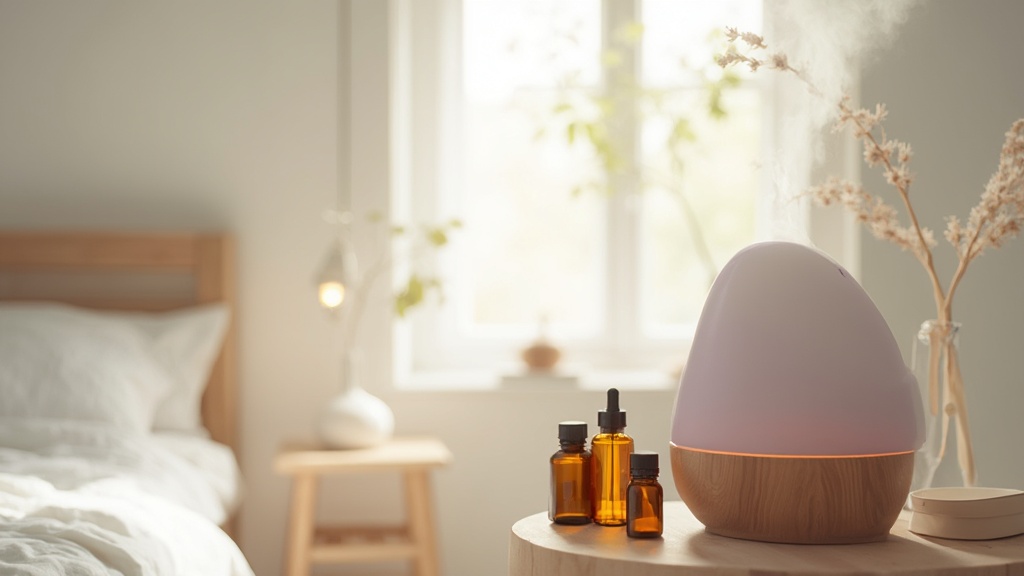
Lavender is perhaps the most well-known essential oil for promoting sleep and relaxation. Its gentle, floral scent has been used for centuries to calm the mind and prepare the body for rest.
Time Required: 5-10 minutes before bedtime
Materials Needed: Lavender essential oil, diffuser or pillow spray bottle
Research has shown that lavender can significantly improve sleep quality. A systematic review and meta-analysis published in 2021 found that aromatherapy, particularly with lavender, had a positive impact on sleep quality in adults and elderly people. The study highlighted lavender’s ability to reduce stress, anxiety, and depression, all of which can interfere with sleep.
To use lavender for better sleep:
- Add 3-5 drops of lavender oil to your diffuser and run it for 30 minutes before bedtime.
- Create a pillow spray by mixing 10 drops of lavender oil with 1 oz of water in a spray bottle. Lightly mist your pillow before bed.
- Apply a drop of diluted lavender oil to your wrists or temples before sleep.
Benefits:
- Reduces anxiety and stress
- Improves sleep quality and duration
- Gentle and safe for most people
The effectiveness of lavender in promoting sleep is one of the many natural remedies studied in Naturopathy Practitioner programs. These courses delve into the scientific basis of aromatherapy and other natural sleep aids, providing a comprehensive understanding of holistic approaches to health and wellness.
2. Chamomile: Nature’s Tranquilizer
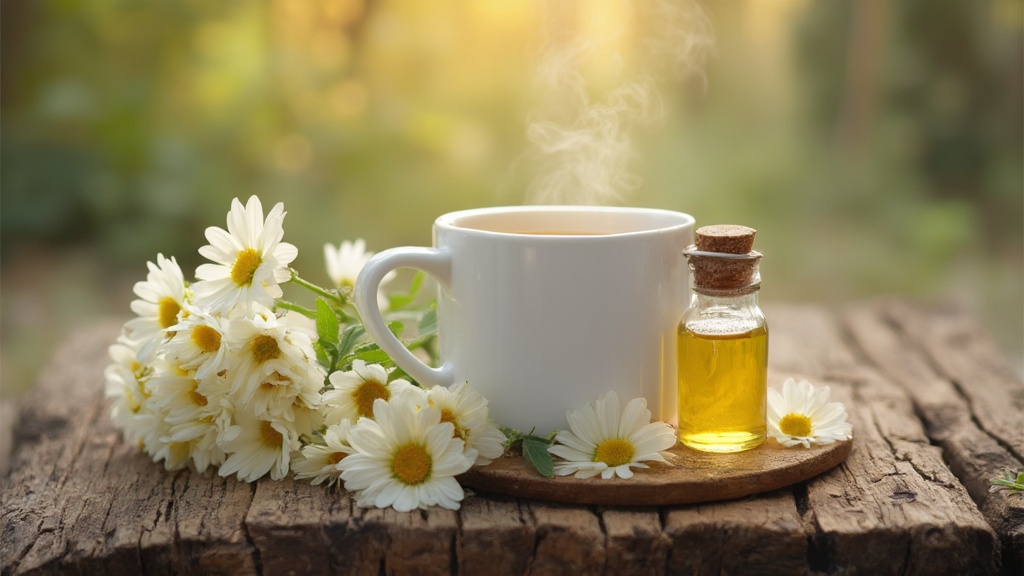
Chamomile is renowned for its calming properties, often consumed as a tea but also highly effective as an essential oil for sleep improvement.
Time Required: 15-20 minutes before bedtime
Materials Needed: Chamomile essential oil, carrier oil (like jojoba or sweet almond oil), diffuser
Chamomile contains apigenin, a flavonoid that binds to specific receptors in the brain, potentially decreasing anxiety and initiating sleep. While most studies focus on chamomile tea, the essential oil can provide similar benefits through aromatherapy.
To use chamomile essential oil for sleep:
- Add 3-4 drops to your diffuser and run it for an hour before bed.
- Mix 2-3 drops with a carrier oil and apply to your chest or the soles of your feet.
- Add a few drops to a warm bath for a relaxing pre-sleep soak.
Benefits:
- Reduces anxiety and promotes relaxation
- May improve sleep quality in people with mild to moderate insomnia
- Has a gentle, sweet aroma that’s pleasant for most people
Understanding the properties of chamomile and other herbs is a key component of naturopathic principles. These natural approaches to health often emphasize the body’s innate ability to heal and maintain balance, with essential oils playing a supportive role in this process.
3. Valerian: The Ancient Sleep Aid
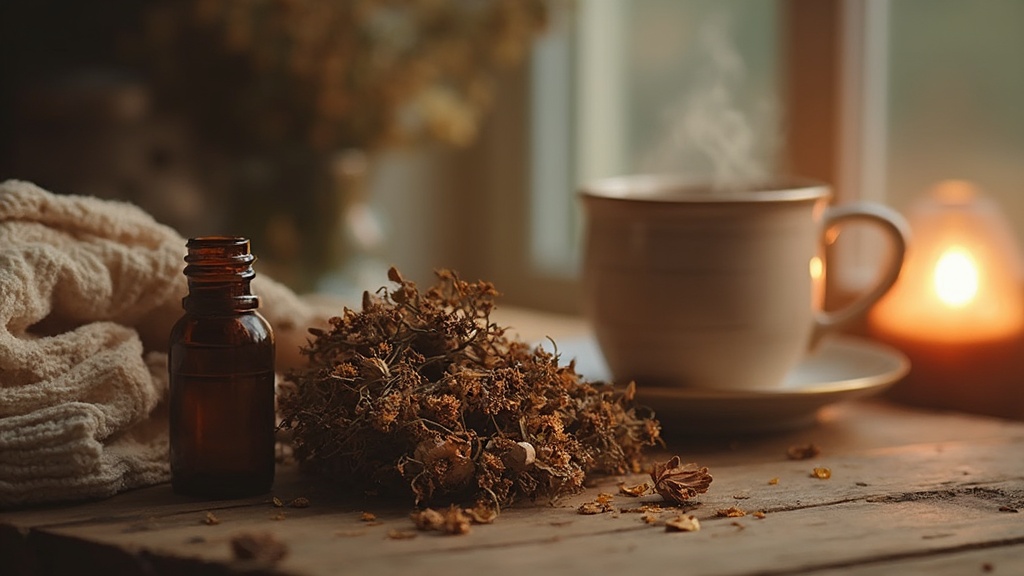
Valerian has been used as a sleep aid for over 2,000 years. While it’s commonly taken as a supplement, the essential oil derived from the root can also be effective for promoting sleep.
Time Required: 30 minutes before bedtime
Materials Needed: Valerian essential oil, diffuser, carrier oil
Valerian works by increasing the levels of gamma-aminobutyric acid (GABA) in the brain, a neurotransmitter that regulates nerve impulses. This can lead to feelings of calmness and improved sleep quality.
To use valerian essential oil for sleep:
- Add 2-3 drops to your diffuser and run it for 30 minutes before bed.
- Mix 1-2 drops with a carrier oil and apply to your wrists or the back of your neck.
- Place a drop on a cotton ball and tuck it inside your pillowcase.
Benefits:
- May reduce the time it takes to fall asleep
- Can improve overall sleep quality
- May be particularly helpful for those with insomnia
It’s worth noting that valerian has a strong, earthy scent that some people find unpleasant. You might want to blend it with a more pleasant-smelling oil like lavender or chamomile.
The use of valerian and other herbal remedies is often explored in naturopathic treatments for specific health conditions, including sleep disorders. This holistic approach considers not just the symptoms but the overall well-being of an individual.
4. Bergamot: Citrus Calm

Bergamot, a citrus fruit, might seem like an unlikely candidate for a sleep aid, but its essential oil has unique properties that can promote relaxation and improve sleep quality.
Time Required: 20-30 minutes before bedtime
Materials Needed: Bergamot essential oil, diffuser, carrier oil
Unlike most citrus oils that are energizing, bergamot has a calming effect. It’s been shown to reduce heart rate and blood pressure, preparing the body for rest. A study published in the journal Complementary Therapies in Clinical Practice found that bergamot essential oil reduced anxiety and improved sleep quality in patients awaiting surgery.
To use bergamot essential oil for sleep:
- Add 4-5 drops to your diffuser and run it for 30 minutes before bed.
- Mix 2-3 drops with a carrier oil and apply to your chest or temples.
- Add a few drops to a warm bath for a relaxing soak before bedtime.
Benefits:
- Reduces anxiety and stress
- Lowers heart rate and blood pressure
- Improves mood, which can lead to better sleep
It’s important to note that bergamot oil can increase photosensitivity. If you apply it topically, avoid sun exposure for at least 12 hours afterward. This kind of safety consideration is crucial in integrating naturopathy with conventional medicine, ensuring that natural remedies are used effectively and safely.
5. Cedarwood: Grounding and Soothing
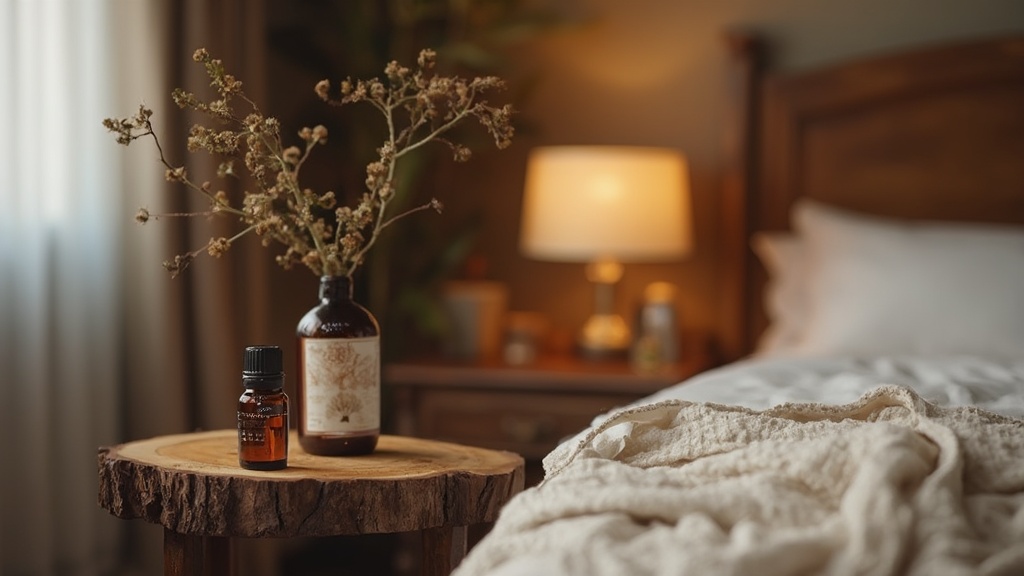
Cedarwood essential oil, derived from the wood of cedar trees, has a warm, woody scent that can help create a calming atmosphere conducive to sleep.
Time Required: 15-20 minutes before bedtime
Materials Needed: Cedarwood essential oil, diffuser, carrier oil
Cedarwood oil contains cedrol, a compound that has been shown to have sedative effects. A study published in the Journal of Physiological Anthropology found that exposure to cedrol increased parasympathetic activity and decreased sympathetic activity, promoting relaxation.
To use cedarwood essential oil for sleep:
- Add 3-4 drops to your diffuser and run it for an hour before bed.
- Mix 2-3 drops with a carrier oil and apply to your chest or the back of your neck.
- Place a drop on a cotton ball and tuck it inside your pillowcase.
Benefits:
- Promotes relaxation and calmness
- May increase melatonin production
- Creates a grounding, comforting atmosphere
The use of cedarwood oil aligns with the holistic approach of naturopathy, which often emphasizes the connection between mind, body, and environment. Understanding these connections is a key aspect of beginner’s guide to naturopathy, providing a foundation for exploring natural health practices.
6. Ylang-Ylang: Floral Relaxation
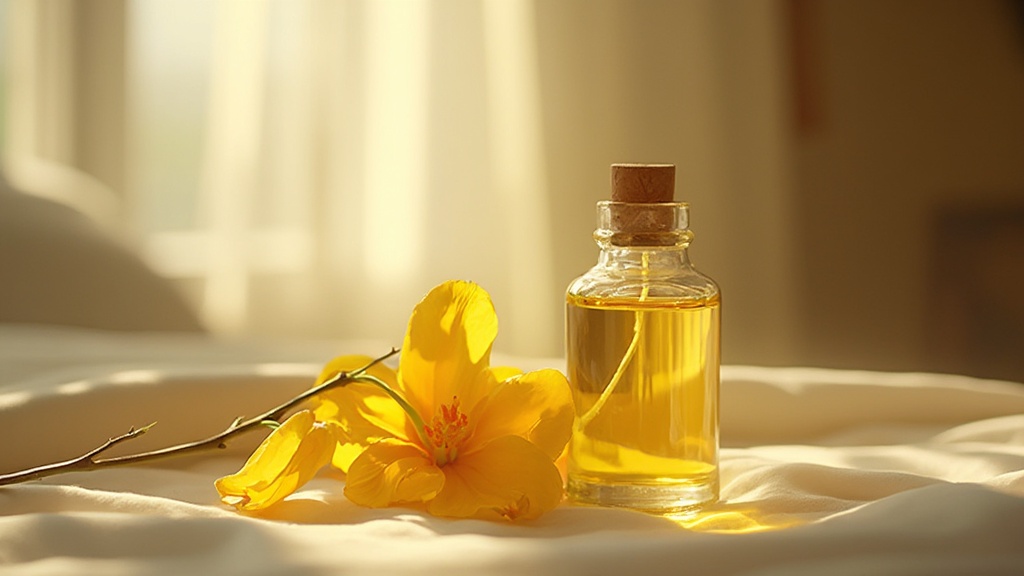
Ylang-ylang, with its sweet, floral scent, is known for its ability to reduce stress and promote relaxation, making it an excellent choice for improving sleep quality.
Time Required: 20-30 minutes before bedtime
Materials Needed: Ylang-ylang essential oil, diffuser, carrier oil
Research has shown that ylang-ylang can decrease blood pressure and heart rate, contributing to a state of relaxation. A study published in the Journal of Exercise Rehabilitation found that inhaling ylang-ylang oil significantly reduced stress levels in healthy adults.
To use ylang-ylang essential oil for sleep:
- Add 2-3 drops to your diffuser and run it for 30 minutes before bed.
- Mix 1-2 drops with a carrier oil and apply to your wrists or behind your ears.
- Add a few drops to a warm bath for a relaxing pre-sleep soak.
Benefits:
- Reduces stress and anxiety
- Lowers blood pressure and heart rate
- Improves mood and promotes relaxation
The use of ylang-ylang and other essential oils for stress reduction is often discussed in the context of naturopathic medicine for women’s health, as stress management is crucial for overall well-being and sleep quality.
7. Sandalwood: Meditative Sleep Support
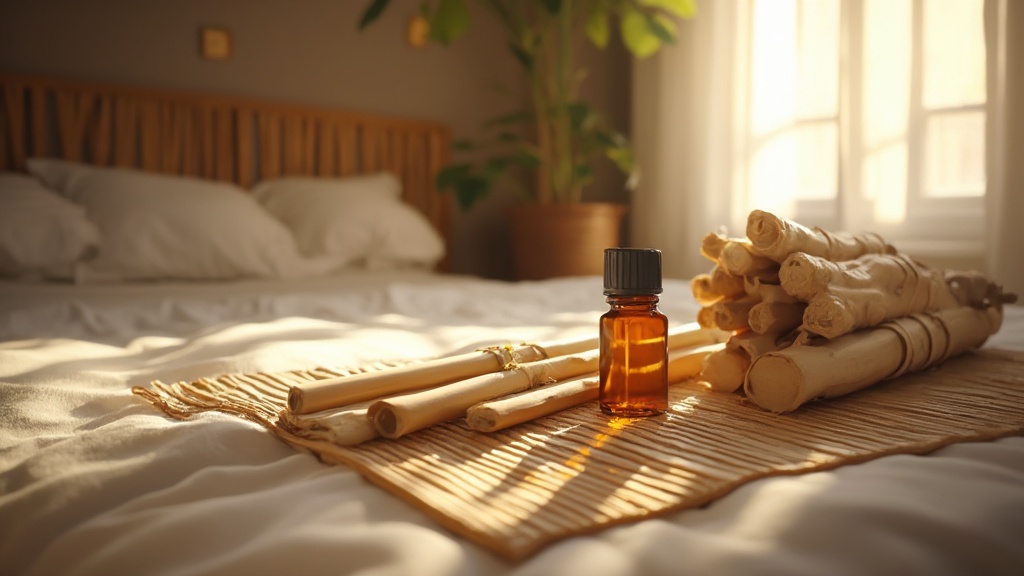
Sandalwood essential oil, with its rich, woody aroma, has been used in meditation practices for centuries. Its calming properties make it anexcellent choice for promoting restful sleep.
Time Required: 15-20 minutes before bedtime
Materials Needed: Sandalwood essential oil, diffuser, carrier oil
Sandalwood contains compounds that have been shown to have sedative effects. A study published in the Journal of Ethnopharmacology found that sandalwood oil inhalation increased non-rapid eye movement (NREM) sleep in rats, suggesting its potential as a natural sleep aid.
To use sandalwood essential oil for sleep:
- Add 2-3 drops to your diffuser and run it for 30 minutes before bed.
- Mix 1-2 drops with a carrier oil and apply to your temples or the back of your neck.
- Place a drop on a tissue and tuck it inside your pillowcase.
Benefits:
- Promotes mental clarity and calmness
- May increase the duration of deep sleep
- Creates a peaceful, meditative atmosphere
The meditative qualities of sandalwood align well with the holistic approach of naturopathy, which often emphasizes the mind-body connection in health and wellness. This perspective is central to understanding the naturopathy vs conventional medicine comparison.
How to Use Essential Oils for Sleep
While each essential oil has its unique properties, there are several general methods for using them to promote better sleep:
- Diffusion: This is one of the most popular methods. Add a few drops of your chosen oil or blend to a diffuser and run it for 30-60 minutes before bedtime.
- Topical Application: Always dilute essential oils with a carrier oil before applying to the skin. Common application points include wrists, temples, and the back of the neck.
- Inhalation: Place a drop of oil on a tissue or cotton ball and inhale deeply, or add a few drops to a bowl of hot water and inhale the steam.
- Bath: Add a few drops of essential oil to a warm bath before bedtime for a relaxing soak.
- Pillow Spray: Mix a few drops of essential oil with water in a spray bottle and lightly mist your pillow before bed.
Remember, everyone responds differently to essential oils. It may take some experimentation to find the oil or blend that works best for you.
Safety Considerations
While essential oils are natural, they are also potent and should be used with care. Here are some important safety considerations:
- Always dilute essential oils before applying to the skin. A general rule is 2-3 drops of essential oil per teaspoon of carrier oil.
- Perform a patch test before using a new essential oil to check for allergic reactions.
- Some essential oils, like bergamot, can increase photosensitivity. Avoid sun exposure after applying these oils to the skin.
- Keep essential oils out of reach of children and pets.
- If you’re pregnant, nursing, or have a medical condition, consult with a healthcare provider before using essential oils.
- Never ingest essential oils unless under the guidance of a qualified aromatherapist or healthcare provider.
For more detailed safety information, refer to this guide from Johns Hopkins Medicine. While it focuses on children, many of the safety principles apply to adults as well.
Conclusion
Essential oils offer a natural, gentle approach to improving sleep quality. From the calming effects of lavender to the grounding properties of cedarwood, each oil brings its unique benefits to your sleep routine. By incorporating these oils into your nightly regimen, you may find yourself drifting off to sleep more easily and waking up feeling more refreshed.
Remember, while essential oils can be powerful tools for better sleep, they work best as part of a comprehensive sleep hygiene practice. This includes maintaining a consistent sleep schedule, creating a relaxing bedtime routine, and ensuring your sleep environment is comfortable and conducive to rest.
If you’re interested in learning more about natural approaches to health and wellness, including the use of essential oils, consider exploring introduction to naturopathy courses. These programs can provide a deeper understanding of how natural remedies like essential oils fit into a holistic approach to health.
Explore More
- What Can You Do with a Naturopathy Certification?
- 7 Reasons to Become a Naturopathic Practitioner
- Dispelling Myths: Naturopathy is Not Pseudoscience, It is Evidence-Based Healing
- Understanding Differences Between Naturopathy Practitioner and Naturopathic Doctor
- Getting Natural Relief from Pain Through Naturopathy

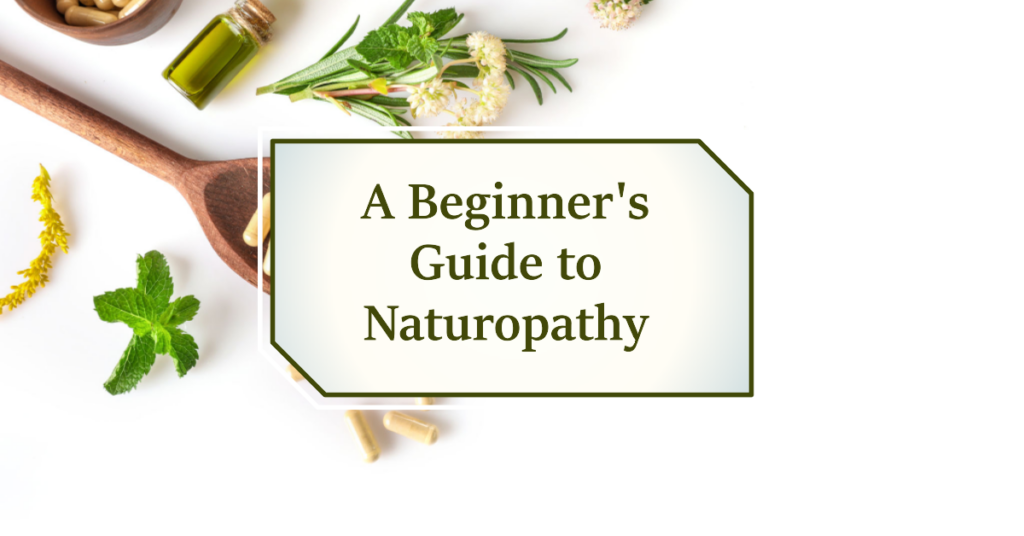


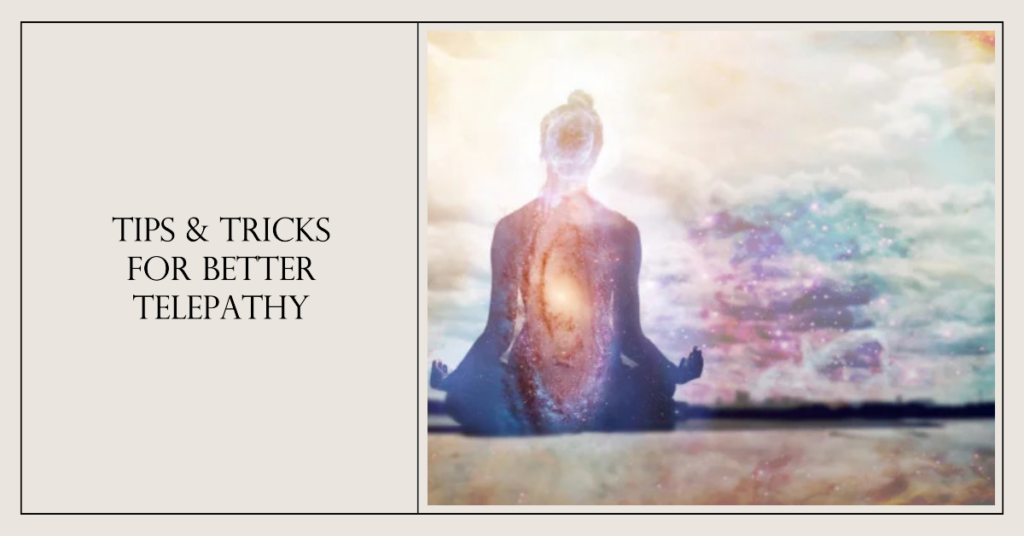
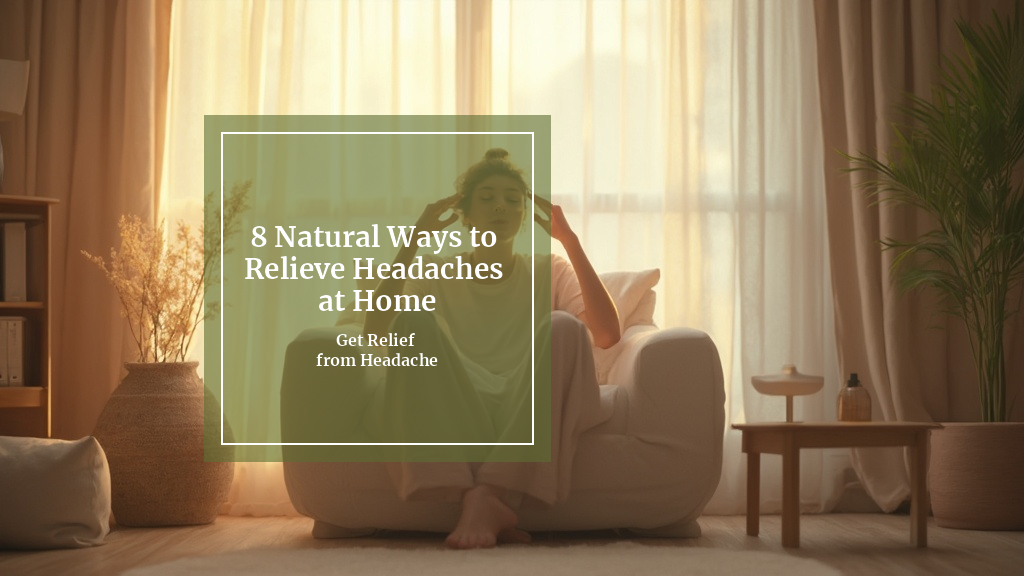




Responses